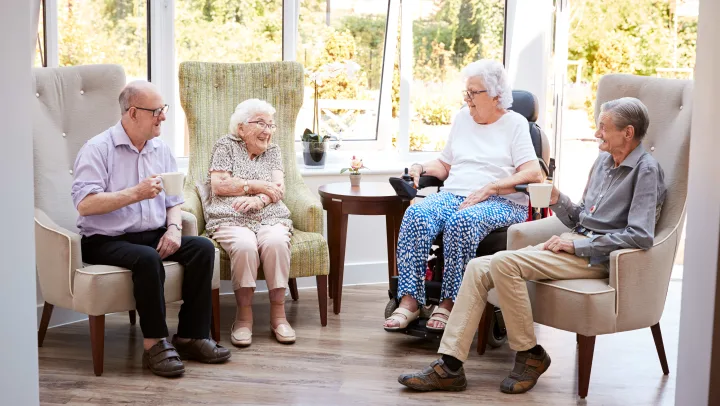Explore specialized Memory Care programs designed for cognitive health.
Explore specialized Memory Care programs designed for cognitive health.
Blog Article
Just How Helped Living Facilities Enhance Lifestyle for Those With Mental deterioration
Helped living centers play a critical duty in enhancing the top quality of life for individuals with mental deterioration by executing tailored treatment methods that deal with their distinctive needs. These settings incorporate structured tasks with psychological assistance, promoting a feeling of community while making certain safety and independence. The assimilation of appealing programs and family members involvement additionally enhances the residents' experience. The complexities of mental deterioration treatment proceed to develop, triggering a more detailed examination of how these facilities adjust and innovate to meet the challenges dealt with by homeowners and their households. What implications does this have for future treatment versions?
Personalized Care Plans
(Dementia Care Charlotte)In a lot of cases, people with dementia call for tailored support that addresses their distinct requirements and preferences. Individualized treatment strategies are crucial in assisted living settings, as they make certain that each resident obtains suitable interest and services. These plans are established collaboratively, entailing medical care specialists, caretakers, and household participants to develop a comprehensive overview of the person's clinical background, cognitive capabilities, and personal interests.
A well-structured personalized care plan generally consists of certain goals associated to health monitoring, day-to-day tasks, and social involvement. It represents the individual's cognitive decrease while promoting freedom and self-respect. Routine evaluations and updates to the care plan are important, as they enable alterations based upon the homeowner's evolving problem and preferences.
Key parts of these plans commonly include medication monitoring, behavior support methods, and dietary guidelines customized to the individual's needs (Memory Care). By concentrating on personalized treatment, helped living facilities can promote a supportive atmosphere that enhances the lifestyle for individuals with dementia, ultimately adding to their general health and happiness. This customized strategy appreciates the individuality of each local, ensuring they receive the caring treatment they need

Engaging Activities and Programs
Involving residents in meaningful tasks and programs is essential for boosting the lifestyle for people with dementia. These activities not only give enjoyment however also promote cognitive function and advertise social interaction, which can alleviate sensations of isolation typically experienced by citizens.

Additionally, individualized programs are crucial in making certain that each homeowner's unique preferences and abilities are acknowledged. This tailored method encourages participation, enhances self-esteem, and provides a sense of accomplishment.
Moreover, routine analyses of locals' rate of interests can aid staff customize and adjust activities to much better suit evolving demands. By prioritizing a fantastic read engaging tasks and programs, helped living facilities can considerably boost the overall experience and psychological wellness of individuals living with mental deterioration.
Safe and Encouraging Atmosphere
Producing a safe and encouraging atmosphere is important for people with mental deterioration, as it directly influences their wellness and lifestyle. Aided living facilities are developed with specific attributes that promote safety while fostering a complacency and convenience. These atmospheres prioritize access, with formats that lessen complication and motivate freedom, enabling citizens to navigate their environments much more easily.
Safety and security procedures, such as protected entries and departures, prevent straying and unauthorized accessibility, which are important considerations for people with dementia (Assisted Living). Employee are trained to identify the distinct demands of homeowners, giving tailored assistance and guidance to guarantee their safety. The incorporation of soothing shades and acquainted things can help minimize anxiousness and disorientation, creating a much more soothing atmosphere.
Along with physical safety and security, emotional support is extremely important. Facilities often use team who are not only proficient in caregiving yet additionally educated in compassion and interaction, fostering count on and rapport with citizens. This all natural approach contributes to a nurturing setting where people really feel valued and understood, eventually improving their overall quality of life.
Social Interaction and Neighborhood
A helpful setting not just prioritizes safety but also fosters opportunities for social interaction and community engagement, which are important for individuals with dementia. In assisted living centers, organized tasks and public rooms urge residents to link with each other, minimizing sensations of seclusion commonly experienced by those with cognitive disabilities.
Social communication plays a substantial duty in improving emotional wellness and cognitive function (Memory Care). Engaging with peers in team tasks such as games, arts and crafts, or workout not just boosts cognitive capacities however likewise nurtures a sense of belonging. Facilities typically organize events that advertise socializing, permitting homeowners to develop connections and share experiences, which can be particularly advantageous for those with dementia
Furthermore, a dynamic area environment can improve the overall quality of life for locals. Team members are educated to facilitate communications and support homeowners in forming purposeful connections.
Household Participation and Support
Family members involvement is vital in supporting individuals with mental deterioration in assisted living environments. Proactively involving member of the family not only supplies psychological comfort to citizens yet also promotes a feeling of belonging and connection in their lives. When families join treatment preparation and everyday tasks, they add beneficial understandings about the individual's choices, background, and requires, which can boost individualized treatment.
Moreover, routine household sees can dramatically enhance the psychological health of locals, minimizing sensations of isolation and anxiousness. Member of the family can likewise aid in preserving cognitive function by engaging their loved ones in acquainted discussions and tasks. This communication enhances individuality and helps residents feel valued and comprehended.

Verdict
In verdict, helped living centers substantially enhance the high quality of life for people with dementia via customized treatment plans, involving activities, and a secure environment. Jointly, these factors produce a holistic strategy to care that addresses the distinct needs of individuals with dementia, promoting general well-being and dignity.
Report this page